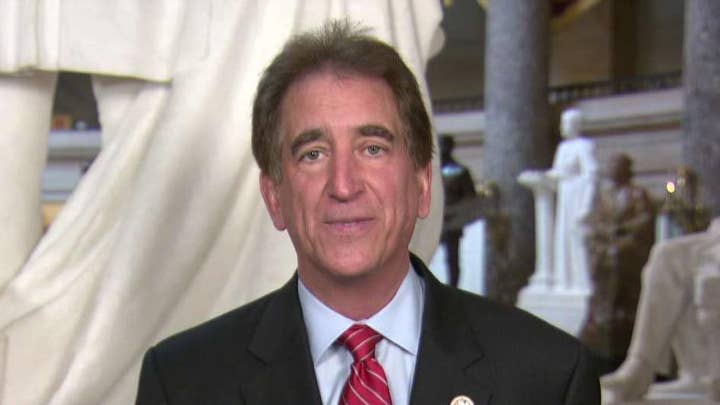Rep. Evan Jenkins: Honored to have Trump's support
Republican West Virginia Senate candidate makes the case for replacing Joe Manchin.
It is said that if someone is to be unpopular, they must look the part. House Republicans appear to have seized that visage for now.
In Tuesday night’s Senate primaries, things didn’t go well in West Virginia for Republican Rep. Evan Jenkins, who lost the GOP nomination to square off with Sen. Joe Manchin, D-W.Va., in November. Patrick Morrisey earned that honor, vanquishing Jenkins and former coal mine executive and convict Don Blankenship.
It was a double-whammy in the Hoosier State for House Republicans Tuesday.
Not long ago, political handicappers believed that Sen. Joe Donnelly, D-Ind., would face either Rep. Luke Messer, R-Ind., or Todd Rokita, R-Ind., in the general election. Nope. Messer and Rokita excoriated each other for months. In commercials, Republican Mike Braun exploited the internecine fighting between Messer and Rokita. Braun portrayed the Republican congressmen as bickering, grade-school rivals who each thought they were hot stuff. Another Braun ad asserted there was really no difference between Messer and Rokita. That spot portrayed both congressmen as life-size, cardboard cutouts.
Braun won – now he, not Messer or Rokita, will face incumbent Donnelly in the general election.
And then there was Rep. Robert Pittenger, R-N.C. Pittenger defeated challenger Mark Harris by a mere 134 votes in the 2016 GOP primary. Pittenger wasn’t as lucky this week, becoming the first House incumbent to lose in the 2018 cycle.
The exception to poor House Republican performance on Tuesday may have been Rep. Jim Renacci, R-Ohio, who defeated Mike Gibbons to secure the GOP nomination to face Sen. Sherrod Brown, D-Ohio, this fall. But House Republicans see trouble.
A primary loss always sends shockwaves through a party on Capitol Hill. Who’s next? Members of Congress are paranoid. They freak out when a greenhorn decapitates one of their own in a primary. Even the House chaplain isn’t safe. And don’t forget the lesson of Rep. Conor Lamb, D-Pa., who flipped a historically Republican district in a special election to Democratic control recently. Rep. Debbie Lesko, R-Ariz., just won a special election to succeed former Rep. Trent Franks, R-Ariz., who resigned. But Lesko’s margin of victory was less than what it should have been in that Republican stronghold.
House Republicans are fretting about losing the House. There’s chatter about a “blue wave.” Retirements and departures are off the charts. House Speaker Paul Ryan, R-Wis., will soon be gone. An eye-popping nine House committee chairmen are exiting.
Rep. Charlie Dent, R-Pa., is retiring. Then Dent announced he was quitting early. Dent is out the door at the end of the week. GOPers are nervous about how they “message” tax reform. Mike Braun was more than happy to aim the roll-call votes of Messer and Rokita back at them. Braun criticized Messer and Rokita for raising the debt ceiling and approving frameworks for “Obama trade deals.”
The issue may be how House Republicans decouple themselves from “The Swamp.”
Yes, it was only the House that managed to approve a bill to repeal and replace ObamaCare. That made good on a Republican promise dating back to 2009. But the measure died in the Senate. Sure. There’s tax reform. But it’s unclear how that message plays among poor or swing voters. Do House Republicans embrace President Trump? Or are they better suited to go it alone and build distance between themselves and the president?
Rep. Steve Stivers, R-Ohio, chairs the National Republican Congressional Committee (NRCC), the national organization charged with electing GOPers to the House. A surprise awaited Stivers outside the Capitol late Wednesday. Former Rep. Steve Driehaus, D-Ohio, materialized near the House steps. Driehaus served one term in Congress, defeating Rep. Steve Chabot, R-Ohio, in 2008. But Chabot rallied to topple Driehaus in 2010. Chabot’s 2008 loss is the only time Democrats have been able to unseat the Ohio Republican in a district they regularly try to flip. But on Wednesday, Driehaus had with him Aftab Pureval, the Hamilton County Clerk of Courts. Pureval just secured the Democratic nomination to face Chabot this fall. Many regard Pureval as the best chance Democrats have to unseat Chabot since Driehaus. It’s the type of district which could fall in a “blue wave.”
Driehaus wanted to introduce Pureval to Stivers – both graduates of Ohio State. The men shook hands and Stivers congratulated Pureval for winning his primary – even though he was unopposed. Of course, as NRCC chair, Stivers is confident Chabot will prevail in November. But it’s not every day that the NRCC chair encounters one of the Democrats he’s trying to beat at the base of the House steps. A not-so-subtle reminder that Democrats intend to make things rough for the GOP this fall – and how challenging it is right now to be a House Republican.
Some of this is just not endemic to congressional Republicans. It may just be that Congress is unpopular. It usually is. Republicans have run the House since January 2011. The GOP has controlled the House for all but four years since January 1995. So, it’s natural that voters may have contempt for the party that has run the institution for so long. That enmity may translate to things like a primary loss in North Carolina or the failure of several House Republicans to win Senate primaries. Congress is toxic. And the moniker “Republican Congressman” doesn’t help much. It means you’re “part of the establishment.” Part of the “swamp.” You may have voted for the $1.3 trillion omnibus package to fund the government in March – which Trump briefly threatened to veto. Perhaps you’re in favor of the farm bill which is slated to come to the House floor next week. But Trump just suggested he may veto the measure unless Congress tightens work requirement standards for people to receive food assistance.
So Jim Renacci won the contest he wanted to win: the Republican nomination for Senate. But fellow House GOPers like Jenkins, Messer, Rokita and Pittenger didn’t. Renacci “lost” a kind of universal “unpopularity contest.”
The question is how House Republicans will fare in other “unpopularity contests” these days.
Capitol Attitude is a weekly column written by members of the Fox News Capitol Hill team. Their articles take you inside the halls of Congress, and cover the spectrum of policy issues being introduced, debated and voted on there.



























